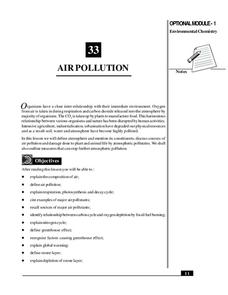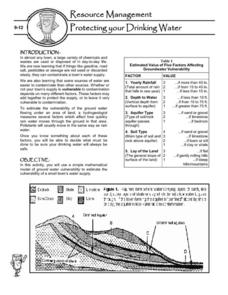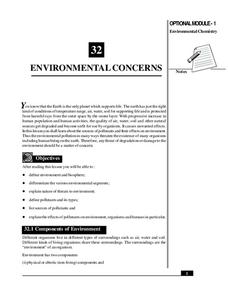National Institute of Open Schooling
Water Pollution
Fifteen million children under the age of five die each year due to diseases in their drinking water. Water pollution is the topic of lesson 34 in the series of 36. Scholars, through reading and discussing, study numerous aspects of...
Teach Engineering
Introduction to Water Chemistry
What are the issues surrounding water quality? Viewers of this short presentation gain information about the importance of clean water, the lack of fresh water, water contamination, and ways that engineers treat water.
Marine Institute
Water Pollution
Sixth graders investigate the various types of pollutants found in water and ways to help prevent water pollution. Through a hands-on experiment, students create samples of polluted water by mixing water with vegetable oil, dirt, and...
NASA
The Case of the Wacky Water Cycle
Join the tree house detectives in learning about the processes of the water cycle, water conservation, water treatment, and water as a limited resource.
San Francisco Public Utilities Commission
Let's Save Water: Water Conservation
Did you know that cutting down your shower by one minute a day can save five gallons of water? Learn about water conservation with a science reading activity. After kids finish reading key terms and water-saving tips in a reading...
Teach Engineering
Water Remediation Lab
Water filtration — that's pure genius! Groups test the ability of a water filter to purify water by running chlorine contaminated water through a filter and measuring the chlorine concentrations as they filter the water. They then graph...
Wilderness Classroom
Pollution
Educate scholars on pollution—air, water, and land—with a series of lessons that begin with a thorough explanation of each type. Learners then take part in three activities to reinforce the importance of reducing pollution. They...
Rivanna Regional Stormwater Education Partnership
Invisible Passengers
How does water pollution affect the organisms living in the water? Use three science experiments to examine how erosion and other pollutants can affect water quality. Each experiment focuses on a different aspect of pollution and...
Earth Day Network
Filtering Water
See the water filtration system up close with a fun science experiment. Young scientists work for several class periods to design a water filter using household objects, and then decide which filter material would be most effective in...
National Institute of Open Schooling
Air Pollution
Seventy percent of the air pollution in China is due to car exhaust. Under the umbrella of environmental chemistry, learners extensively explore air pollution. From the makeup of our atmosphere to sources of major air pollutants, classes...
Curated OER
Drinking Water
In this drinking water worksheet, students complete a crossword puzzle given 23 clues about drinking water purification, water content, contaminants, and softeners.
San Francisco Public Utilities Commission
What is Drought? No Rain, No Water
How can climate change affect our water supply? Have kids read a passage about the water cycle and water conservation, which includes six questions that challenge them to use context clues.
San Francisco Public Utilities Commission
What is Groundwater? Our Underground Water Supply
Learn about the consequences of groundwater with a lesson about the different ways California handles water conservation and pollution. After reading a passage about the water table, learners apply what they have read to six...
US Environmental Protection Agency
Protecting Your Drinking Water
Having a clean, reliable source of drinking water is essential for any community, but in many cases this is easier said than done. Engage young environmentalists in exploring the five factors affecting vulnerability of a groundwater...
San Francisco Public Utilities Commission
Recycled Water: A Smart Way to Reuse Water
Learn about wastewater and recycled water with a science reading activity. After learners finish a two-page passage about conserving the water supply, they answer six comprehension questions about what they have read.
Kenan Fellows
Microorganisms in Pond Water
That is living in the water? Groups of two to three view pond water with microscopes in order to find microorganisms. They draw pictures of the ones they find in their slides. The groups compare their drawings to pictures of common pond...
San Francisco Public Utilities Commission
Pesky Plastics: The Problem with Plastic
What can happen to the environment if plastic continues to pollute it? Learners read about the implications of plastic on health, water, and nature in a two-page reading passage. After they finish reading, they work on six comprehension...
Teach Engineering
Introduction to Environmental Engineering
A series on environmental engineering introduces the class to issues that environmental engineers work to solve. This first lesson focuses on air and land issues, and looks at ways to reduce pollution.
National Institute of Open Schooling
Environmental Concerns
Every year, more than 14 billion pounds of garbage is dumped into the oceans of the world, most of which is plastic and toxic to ocean life. Lesson 32 in the series of 36 focuses on environmental concerns, specifically pollution. Under...
US Environmental Protection Agency
A Mock Town Meeting on a Proposed Tank Farm
Intended as a follow up to the Protecting Your Drinking Water activity, young environmentalists use their assessment of the a hypothetical town's water supply to debate the installation of underground chemical storage tanks. With the...
NOAA
Seafood and Human Health
Whether your young biologists realize it or not, humans play a significant role in marine ecosystems. To help them understand this fact children first create graphical representations that show homo sapiens' place in marine food chains,...
Teach Engineering
Density and Miscibility
The liquids did not mix — so what do density columns have to do with it? The seventh part in a series of nine provides the theoretical explanation of why density columns do not mix. The activity covers the topics related to mixing and...
Curated OER
Pelicans in Peril
In this Gulf oil spill worksheet, students examine an article regarding the brown pelican and the effects of the oil spill as well as a photograph.
Curated OER
Environmental Issues
For this environmental issues worksheet, students are given 10 current topics that are problems in our environment today. They complete sentences about each topic by filling in the blanks with the appropriate terms. Some of the issues...

























